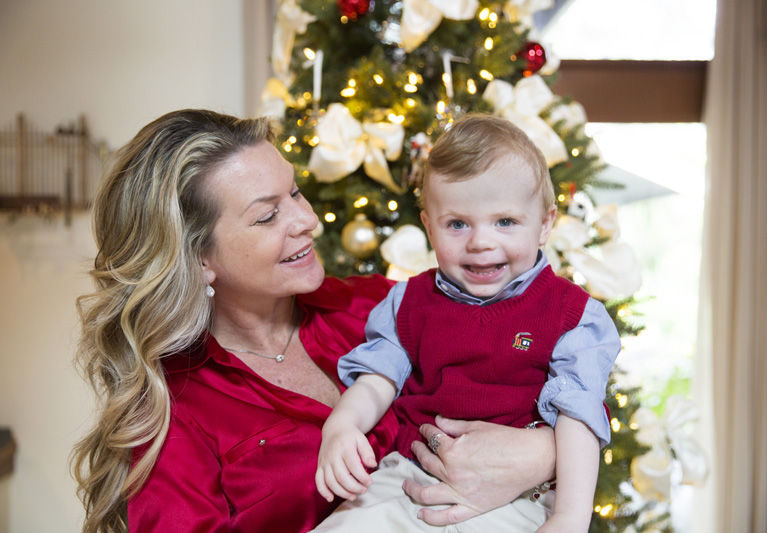
This Christmas, Kristin Bracken says, is the happiest of her life. Her little boy Kaiden, who turns 2 next month, is back from the brink, chasing a noisy, lit-up toy car as it wobbles recklessly through his grandparents’ living room.
Only one year ago, the noise and flashing lights were coming from monitoring equipment surrounding Kaiden in the only home he knew: Joe DiMaggio Children’s Hospital, two hours south of Vero in Hollywood, FL. It was there that he had been rushed by specially equipped ambulance at the age of four months, his heart enlarged and perilously close to stopping.
Eight months later, just weeks before last Christmas, Kaiden entered surgery for a rare pediatric heart transplant, and became the first baby in South Florida to get a heart from a donor of a different blood type.
This Christmas, instead of a tiny tree in that hospital room, Kaiden is celebrating under a real tree eight feet tall, with his stocking hanging on the nearby mantel. His grandparents, Linda and George O’Malley, south island residents and former owners of a downtown art gallery, are blissfully blasé after so many months of worry, waiting for a signal from the remarkably good-natured boy that he’s finally ready for a nap.
Not that all is normal. In the past month alone, the family has driven Kaiden to 35 appointments from here to Broward County for medical check-ups, blood tests, speech therapy and physical therapy. Each of his half-dozen doctors has to be approved specifically by the transplant team at Joe DiMaggio, so complex are the medical issues involved in heart transplantation. Some issues will stay with Kaiden for the rest of his life.
Three times a week, when Bracken and Kaiden have to drive to Hollywood, the O’Malleys trade off going with her.
“She can’t manage all of this stuff and stay in the front seat driving,” says George. “What if the baby starts fussing?”
Bracken coordinates the myriad appointments geographically – the neurologist in Miramar, the pulmonologist in West Palm Beach, the rehab doctor in Hollywood, and a cranial facial doctor in Boca Raton. That last specialist checks on the progress of a specially fitted helmet that is slowly reshaping Kaiden’s head, flattened after months of lying down.
He also has to wear special braces on his left arm and leg because he suffered a stroke when a clot formed in his mechanical heart. It nearly left him severely disabled and ineligible for a transplant.
Instead, the plasticity of his young brain allowed other areas to take over for the damaged portions, a recovery process that is still ongoing.
That continuing weakness delayed his learning to walk, in part because he wouldn’t use his affected arm to break a fall.
With the brace at his elbow giving his arm solidity, he soon regained the instinct to thrust it out in front of him. “His brain tells him to move both parts of his arm at the same time instead of separately,” says Bracken. “The arm brace allows him to extend his left hand more.”
Kaiden took his first step six months ago. “Oh my God, I will never forget it,” says Bracken. “He was walking to come to me, and when we met, we celebrated with a little happy dance together. It was just amazing.”
His gait is a little off-kilter still, but not enough to slow him down, and doctors expect him to eventually recover full movement.
“The thing that really motivated him is the piano,” says Bracken, who herself has perfect pitch and swears her son only plays notes that sound musical together. “He’s been playing it since he was one, and now he can just walk over to it. It’s great because I can tell where he is if I have to step away.”
Bracken is herself an accomplished musician. Along with piano, she plays a wide range of instruments, and before Kaiden came along, she played flute in a quartet at Holy Cross Church.
Professionally, Bracken is a forensic sociologist. But her job with the public defender’s office terminated when her family leave gave out. Finding work again will be complicated by the fact that Kaiden can’t be placed in day care.
His exposure to public places, including other children, has to be closely monitored if not avoided. He is much more vulnerable to things like the common cold because his immune system has to be suppressed with drugs to keep his body from rejecting the transplanted heart.
And normal childhood diseases are even more of a threat. Kaiden is one of those compelling reasons why doctors urge parents to immunize their children. “Kaiden cannot have a lot of immunizations that other kids can have,” says Bracken. “He can’t be injected with a live virus.”
It will take him much longer to recover from any sickness he does get, including the flu, she says.
So it’s Bracken who makes sure all his caregivers have had flu shots and that visitors either get the shot or wear a mask. “I’m the mother,” she says. “I’m the sole medical oversight.”
That means no going to the grocery store, and no going to church – the two places she would normally visit most often and the two top germ-laden sites according to Kaiden’s doctors.
Even at their various appointments, if the waiting room is crowded, Bracken and Kaiden wait outside. “Some people just don’t understand,” she says with a shrug. “But I’m his Mama Bear.”



